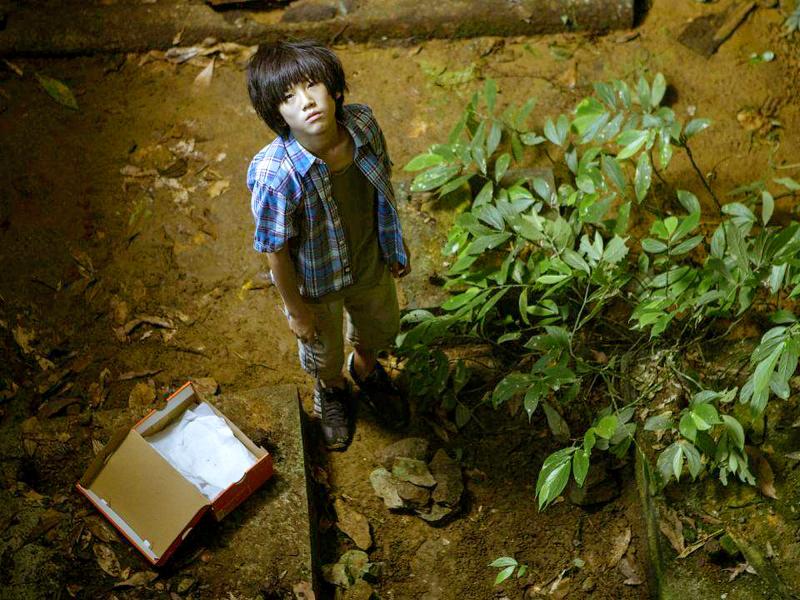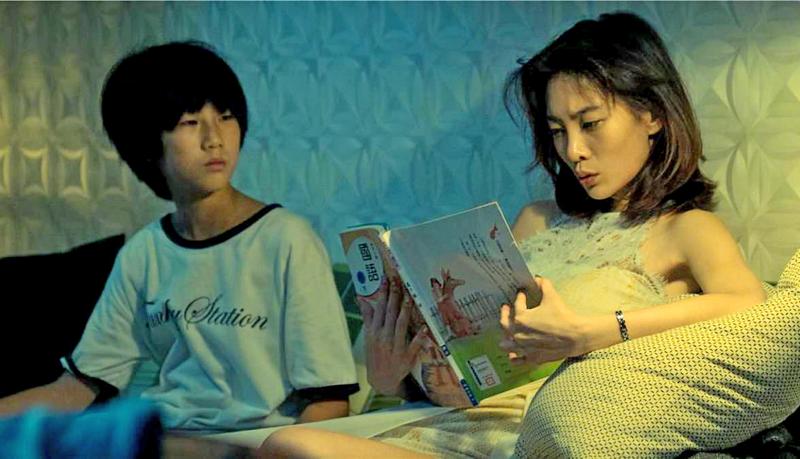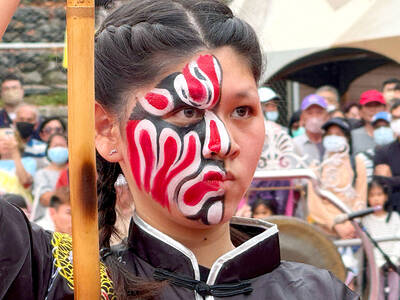Wild Sparrow (野雀之詩) is simple and extremely slow paced, told through the eyes of Han (Kao Yu-hsia, 高於夏), an introspective, shy grade schooler who lives with his great-grandmother in the verdant countryside.
Han has a fascination with sparrows, which are either flying high in the sky or trapped in cages and nets, providing a constant metaphor throughout the film. In the most ironic scene, a man catches the birds just to charge people to set them free again, taking advantage of Buddhists who engage in the ritual of “releasing” animals from captivity. Han takes a badly injured sparrow home and buries it when it dies, and his idyllic and innocent life ends there.
Like most rural areas in Taiwan, the bulk of the population has left for work in the cities, leaving old people and children behind. While the scenery is stunning, the lack of human presence is haunting as those who remain do what they can to scrape by.

Photo courtesy of Hooray Films
Han is suddenly whisked to the urban jungle of Jhongli (中壢) when his elementary school shuts down — another common phenomenon in rural areas — staying with his young mother Li (Lee Yi-chieh, 李亦捷) who leads a dysfunctional life, bouncing between bad and often abusive relationships, hostess clubs and prostitution to survive.
The film was nominated for several awards in last year’s Taipei Film Festival (台北電影節), with Lee winning Best Actress, but it did not make its box office premiere until last week.
Lee does a superb job depicting the life of Li, a lost woman who often returns home drunk or with a man while acting erratically toward Han. She is loving and overbearing and resentful toward Han at the same time, delivering a complex and heartfelt performance that is surely worthy of her award.

Photo courtesy of Hooray Films
It’s a poignant exploration of people from less fortunate backgrounds, especially women, who fall through the cracks. Li is also a sparrow, longing to be free but unable to break out of the cycle of being controlled by men in all aspects of her life. These men use her for their own desires and purposes, and Han has nobody to look up to despite being a model student praised by his teachers. Li does attempt to act as a protector to Han, but she is hardly able to protect herself and put her life together, let alone care for him.
Shih’s atmospheric, dreamlike sequences are loaded with raw emotion that cut to the bone and makes up for the lack of overall narrative. The 4:3 format focuses the audience’s perspective into a more claustrophobic, confined space, enhancing the feelings of helplessness and despair. When not looking through Han’s eyes, the viewer is placed right on the periphery of each scene, behind a tree, door, curtain or window, close enough to feel Han’s and Li’s pain, but all one can do is endure it with them while the events unfold.
The lighting, color and composition of each scene, from the lush, lonely hills to the colorful shining lights of the hostess clubs to the muted cold tones of Li’s apartment, are all carefully calculated, and they blend into each other in brief moments. Every scene is like a painting, and perhaps only by detaching from reality and employing surreal, almost fantastical aesthetics can one bear the hopelessness of the characters’ situations.
The resulting product, as the movie’s Chinese-language title suggests, is a tragically beautiful poem that fully captivates the viewer and immerses them in the suffocating world that Han and Li live in. Shih has done a masterful job in his full-length debut, and Wild Sparrow is a prime example of a slow-moving arthouse movie that doesn’t bore.

April 7 to April 13 After spending over two years with the Republic of China (ROC) Army, A-Mei (阿美) boarded a ship in April 1947 bound for Taiwan. But instead of walking on board with his comrades, his roughly 5-tonne body was lifted using a cargo net. He wasn’t the only elephant; A-Lan (阿蘭) and A-Pei (阿沛) were also on board. The trio had been through hell since they’d been captured by the Japanese Army in Myanmar to transport supplies during World War II. The pachyderms were seized by the ROC New 1st Army’s 30th Division in January 1945, serving

The People’s Republic of China (PRC) last week offered us a glimpse of the violence it plans against Taiwan, with two days of blockade drills conducted around the nation and live-fire exercises not far away in the East China Sea. The PRC said it had practiced hitting “simulated targets of key ports and energy facilities.” Taiwan confirmed on Thursday that PRC Coast Guard ships were directed by the its Eastern Theater Command, meaning that they are assumed to be military assets in a confrontation. Because of this, the number of assets available to the PRC navy is far, far bigger

The 1990s were a turbulent time for the Chinese Nationalist Party’s (KMT) patronage factions. For a look at how they formed, check out the March 2 “Deep Dives.” In the boom years of the 1980s and 1990s the factions amassed fortunes from corruption, access to the levers of local government and prime access to property. They also moved into industries like construction and the gravel business, devastating river ecosystems while the governments they controlled looked the other way. By this period, the factions had largely carved out geographical feifdoms in the local jurisdictions the national KMT restrained them to. For example,

Shunxian Temple (順賢宮) is luxurious. Massive, exquisitely ornamented, in pristine condition and yet varnished by the passing of time. General manager Huang Wen-jeng (黃文正) points to a ceiling in a little anteroom: a splendid painting of a tiger stares at us from above. Wherever you walk, his eyes seem riveted on you. “When you pray or when you tribute money, he is still there, looking at you,” he says. But the tiger isn’t threatening — indeed, it’s there to protect locals. Not that they may need it because Neimen District (內門) in Kaohsiung has a martial tradition dating back centuries. On